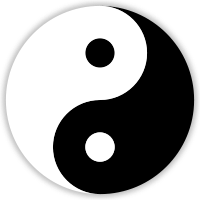In an interview conducted in the mid 1960s—Julius Evola: A Justified Pessimism—Evola provided a précis of his life’s work. He answered all the questions very simply and it demonstrates how little his ideas changed in the preceding 40 years. This is how he answered the question about the influence of Guenon on his work:
Q In your book Il Cammino del Cinabar, where you laid out the genesis of your works, you acknowledged that the principal defender of the traditional worldview, Rene Guenon, exercised a certain influence over you, to the point that you have been called the “Italian Guenon”. Is there a perfect correspondence between your thought and Guenon’s? And don’t you believe, concerning Guenon, that certain circles overrate Oriental philosophy?
A My orientation does not differ from Guenon’s insofar as it concerns the value attributed to the World of Tradition. By the World of Tradition, we mean an organic and hierarchical civilisation in which all activities are oriented from above and are based on values that are not simply human values. Like Guenon, I wrote different works on traditional wisdom, studying their sources directly. The first part of my principal work, Revolt against the Modern World, is precisely a morphology of the world of tradition. There is also a correspondence between Guenon and me concerning the radical critique of the modern world. On this point, there are however some divergences between us. Given his “personal equation”, in traditional spirituality Guenon assigned knowledge and contemplation ahead of action; he subordinated the royal to the sacerdotal. I, on the other hand, have endeavoured to present and emphasise the traditional legacy from the point of view of the warrior caste and to show the possibilities equally offered by the way of action. A consequence of this different point of view is that, while Guenon employs an intellectual elite as the base for the possible reconstruction of Europe, as far as I’m concerned, I am more inclined to speak of an order. The judgments that Guenon and I give to Catholicism and Freemasonry also diverge. I believe, however, that Guenon’s formulation is not situated on the path of Western man, who is, in spite of everything, oriented especially toward action.
Commentary
This leaves no doubt that there is profound agreement between the two thinkers, both on the nature of Traditional societies and their quarrels with the contemporary world. What is omitted are the Traditional teachings on the primordial tradition, the primordial state, the constitution of man as spirit/soul/body, the four phases of the cosmic cycle, and so on. But a careful reading shows that their “divergences” do not represent an insurmountable opposition, but rather reflect the same thing from a different point of view.
While Guenon holds that the primordial tradition takes different forms in different eras and cultures, he does not account for those differences. Evola goes a step further with his concept of the “race of the spirit”, such that a form that is suitable for one race may not be for another race.
The other divergence is related to the castes and the different spiritual stances appropriate to each one. Thus, Guenon describes the contemplative type of spirituality proper to the sacerdotal caste and Evola describes the one proper to the warrior caste. Their only difference, then, is the question of which one should be dominant. Once again, this can be resolved by the “race of the spirit”: the Eastern races are dominated by the spirit of contemplation and the Western race by the spirit of action. This is all consonant with cosmic law, and is represented by the teachings of Taoism, which Evola valued highly.
 Bear in mind that what Evola means by action is more like the wei-wu-wei of Taoism — action/non-action — and not the frenzied activity of the modern world that was represented by Futurism, an artistic movement that Evola in his youth was associated with, but seems to have left behind. Evola ends his answer on this note:
Bear in mind that what Evola means by action is more like the wei-wu-wei of Taoism — action/non-action — and not the frenzied activity of the modern world that was represented by Futurism, an artistic movement that Evola in his youth was associated with, but seems to have left behind. Evola ends his answer on this note:
Unfortunately, what characterises the modern European world is not action but its falsification, that is, an activism deprived of a foundation that is limited to the domain of purely material productions. They are detached from heaven under the pretext of conquering the earth, to the point of no longer knowing what action truly is.
good site qhplme